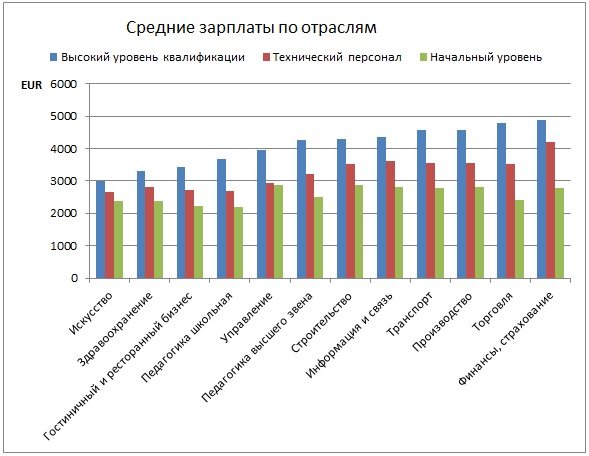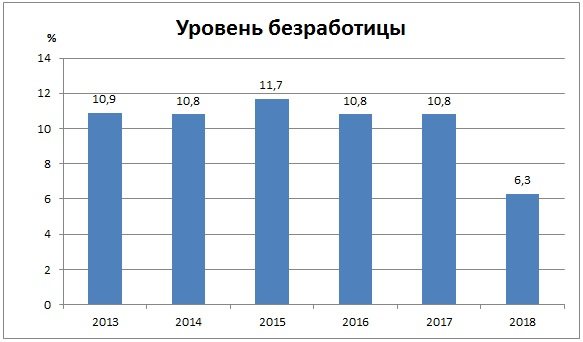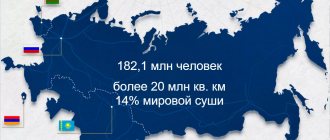Once quiet, provincial and sparsely populated Finland, the harsh northern region on the very outskirts of Europe, is now in the leading position in the European labor market in terms of average wages. According to these indicators, only Denmark, Monaco, Luxembourg, Norway and Switzerland are now ahead of it in the countries of the European Union. 3,378 euros is the local average gross salary (that is, before tax; Finnish bruttopalkka).
Finland today is one of the few European countries with a very high standard of living.
Salaries in Finland by profession in 2021
In Finland, as in many countries, there are two spheres of business - private and public. The average salaries in them are slightly different; you can earn more in the private sector. In the current year 2021, the average salaries in Finland are (public sector/private sector):
- Hotel service and catering – 2215 € / 2471 €
- Health and social services services – 2978 € / 2783 €
- Information technology – 3568 € / 4208 €
- Education – 3472 € / 3604 €
- Real estate transactions – 3057 € / 3533 €
- Industry – 2603 € / 3535 €
- Entertainment and relaxation – 2598 € / 3149 €
- Agriculture, forestry and fisheries – 2557 € / 2866 €
- Construction – 3142 € / 3296 €
- Trade sector – 2632 € / 3185 €
- Finance and insurance – 4323 € / 4122 €
- Electricity, gas, heat and water supply – 3287 € / 3673 €
Information according to the website of Statistics Finland – www.stat.fi.
Minimum wage
In Finland there is no officially established, legally enshrined minimum wage level - the state simply does not interfere in such issues. In each individual sector of the country's economy, the minimum wage (i.e., the minimum acceptable wage) and other conditions are determined by special Collective Labor Agreements (TES).

For each private contract, its very terms thus establish and provide for mandatory compliance with the terms of the above-mentioned Collective Labor Agreement for a particular sector of the Finnish economy. In some cases, such contracts directly stipulate compliance with these conditions, which automatically sets the minimum wage accepted in this particular industry by the same TES and all additional payments due to it.
However, if the expected salary is obviously lower than the level established by the same TES, such a contract, that is, its very terms, can be challenged in court. In this case, industry union members are provided with a free lawyer to assist them. However, one should take into account the fact that currently there are not trade unions in all sectors of the Finnish economy.
In the absence of a fundamental Collective Labor Agreement, the basis for calculating the minimum wage is the established level of the subsistence minimum - 1,160 euros.
It is clear that the lowest wages fall to people without education and qualifications: loaders, cleaners, and unskilled workers in general.
average salary
According to Statistics Finland, the average salary in the country as of 2021 is 3,313 euros. Moreover, the average indicator will depend not only on the region, but also on the age of the employee, as well as on his level of education.

Average monthly salary in Finland by specialty in euros, gross - without tax deductions (information from the website tyopaikat.oikotie.fi):
- nanny, nurse – 2,102;
- maid, cleaner – 1,700;
- waiter – 2,000;
- seller – 2,398;
- security guard – 2,200;
- electrician –2,800;
- laboratory assistant – 3,550;
- architect (employee of an architectural bureau) – 4,000;
- teacher, lecturer – 3,836;
- builder – 2800;
- junior health worker (nurses, etc.) – 2,220;
- engineer – 3,600;
- programmer (specialist in the field of IT technologies) – 3,080;
- doctor – 7,500.
Let us note in passing that a significant part of the Finnish population is employed in the service sector - experts also give a more or less exact number of employed people - about 70 percent. At the same time, the capital’s salary level is 15-20 percent higher than the national average, but life itself in Helsinki is much more expensive than in the provinces. But more on that below.
Working as a doctor in Finland
In order to work as a doctor in Finland, you need to undergo certain procedures in the appropriate order. We thank our wonderful friends - doctors from the north of Finland, who shared information with us and clearly, in order, described the entire procedure. Working as a doctor in Finland is in demand and well paid, here you will always find open vacancies - from a nurse to a surgeon. Of course, with a Russian diploma, it is not easy for a doctor, even with extensive experience, to move to work in Finland, but, believe me, it is quite possible. You can ask any questions on this topic or to our specialists by email. This email address is being protected from spambots. To view the address, Javascript must be enabled in your browser, or in the section of our forum in the topic Working in Finland. We are also ready to connect you with people who are in the process of moving or with those who have already moved to Finland and are working as a doctor.
Procedure:
- you must pass the Finnish language exam (yleinen kielitutkinto) at the intermediate level (keskitaso), you can read more about this exam in the section of our website Study and courses in Finland.
- Apostille your diploma
- officially, from a licensed Finnish translator, translate your education diploma (with an apostille), its insert, all additional certificates that you have, your work book, as well as characteristics from your place of work, which must be taken in advance, and a certificate from the Ministry of Internal Affairs about no criminal record
- have copies of your translated documents certified by a Finnish magistrate (you can do this yourself in any magistrate of any city, or anyone you know can do it for you)
- obtain a tourist visa and write an explanation in free form why, at the time of submitting an application for confirmation of documents, you do not have an address in Finland and a work visa
- go to the website www.valvira.fi, fill out an application (hakemus), attach all the necessary documents to it (those described above, as well as those that valvira requires additionally), do not forget to indicate the address in Finland, where the documents about confirmation (i.e. a notification will be sent to your email address that the decision has been made, and an envelope with documents will be sent to your postal address in Finland)
- with this paper from valvira you need to look for a trainee position (amanuenssi) in a Finnish clinic or hospital (for 6 months). The trainee's salary is not big, about 1000 euros, do not forget that you also need to obtain a residence permit in Finland
- after 6 months of practice, you will be allowed to take the first exam “clinical tasks” or medical knowledge (you are given 3 attempts to pass this exam, i.e. if you do not pass it 3 times, documents about your medical education will not be legalized in Finland can)
- after successfully passing the first exam, you can work as a doctor’s assistant, whose salary is already higher, and after 6 months you will be allowed to take the second exam again - medical laws
- After successfully passing this exam, you continue to work as a medical assistant and after some time you pass the third mandatory exam - “bedside”, i.e. practical medical skills.
After this, you are entitled to work as a doctor in Finland, as a general practitioner (yleislääkäri) under the supervision of an experienced Finnish doctor. In this position, your salary will be on average 4,000 euros (for example, in the HUS system, similar doctors receive 5,000 euros) - of course, the salary is always stated before taxes. Read more about payroll taxes in the Work/Taxation in Finland section of the website.
Next in terms of qualifications are specialized doctors (erikoislääkäri); it will take several more years to obtain such a specialization. For example: the average salary of such a doctor in Finland is 5000-7000 euros per month (HUS 5000-10000 Eur, Kanta-Hämeen Keskussairaala 5900 Eur, Vsshp 4800-8000 Eur). In some regions and medical institutions, a doctor must also speak a second official language, Swedish, but this requirement is not always mandatory. Sometimes it's just a formal general knowledge exam. In any case, every language that a doctor speaks in Finland increases his chances of getting an even better job.
Salary taxes
Suomi has a progressive taxation scale.
High salaries in Finland also mean high taxes, amounting to about 35-40 percent of wages. Thus, in addition to income tax, the country provides for municipal tax in the amount of 16 to 23 percent.
It is clear that in conditions of fair redistribution of funds transferred to the country’s budget from the collection of taxes, its social security sector is dynamically developing, the strength of the local economy is also growing, and its “stress resistance” to various kinds of financial shocks is increasing.
Income tax
Persons with a salary of less than 1,700 euros per month are not subject to income tax. In Finland, such people are considered low-income and entitled to various benefits.
By the way, when calculating income tax, a number of factors are taken into account, such as: year of birth, religion, marital status, presence of children or dependents, etc. Of course, the individual level of annual income is also taken into account. On average, this tax rate can range from 16.5% to 22.5%.
Social contributions and other taxes
In addition to taxes, the working Finnish population pays various social contributions to the budget of their country: for example, a real anachronism in the form of a certain church tax in the amount of 1-2 percent. The monthly mandatory contribution to the pension fund is 5.8-5.15 percent, and the contribution to the unemployment fund is 0.6 percent.
You can find out the exact amount of tax deductions from wages in Finland using a special online calculator.
How to confirm a doctor's diploma

Medical graduates who received their education outside the EU can also get a job in Finland, but to get hired they must pass three exams at the University of Tampere. Photo: Sakari Piippo / Finland Promotion Board
According to the statistical report of the Association of Finnish Medical Professionals, at the beginning of 2015 there were 20,403 registered doctors living in Finland and authorized to practice medicine. Finnish is the mother tongue of 18,209 specialists. The rest named Swedish (758 people), Russian (398), Estonian (334), German (84), etc. as their native language.
“It’s quite easy for doctors to get a job, but the shortage of specialists in our healthcare system is gradually decreasing,” says Hannu Halila, deputy director of the Finnish Doctors’ Association. “It is not very difficult for specialists who come to us from the countries of the European Union to obtain a work permit from the Finnish state control and supervisory service for social security and health care, Valvira.”
Specialists from EU countries do not need to undergo additional training or pass any exams. In the future, perhaps they will take an exam in Finnish or Swedish.
Ratio of salary and living expenses, cost of living
In terms of the level of spending of its population, modern Finland is also among the top four EU countries - only Denmark, Sweden and Austria are ahead. The largest portion of the average Finnish family's expenses is on food. High-quality, environmentally friendly, natural products - and this is already an axiom not only in Finland, but throughout the world - are very expensive.

The individual cost of living here is 1,160 euros per month, and for a family it is already 1,700 euros. In Helsinki, life is 20-30 percent more expensive.
The second place in terms of expenses for the population of Suomi goes to housing: everything matters - its location, total footage and quality. Rental prices in the province and in the capital region also vary. For example, in Kuovola these prices range from 566 to 711 euros per month, and in Helsinki you will have to pay from 610 to 1,181 euros per month for the same housing.
Utilities and transportation costs also take a significant toll on the wallets of Finnish citizens.
173 euros is the minimum that you will have to pay monthly for the maintenance of an apartment of about 80 square meters. meters (payment for electricity, hot and cold water, heating, etc.).
A monthly pass in Kuovola costs 35 euros, and in Helsinki it costs 54.7 euros.
The difference in gasoline prices in the provinces and in the capital is insignificant and amounts to only 1-2 eurocents. However, car owners will have to fork out another 800 euros per year - for taxes, technical inspection and insurance of their iron horse. And this does not even take into account the costs of its repair and maintenance.
Unemployment rate and migrants' prospects
Currently, there is a strong downward trend in unemployment in Finland. At the same time, it is noted that 85 percent of the country’s employed citizens have higher education, and most of the unemployed are registered with local employment services and receive unemployment benefits.
Foreigners, incl. labor migrants from the republics of the former USSR (Russia, Belarus, etc.) are entitled to an adaptation allowance paid during the first three years of their stay in Finland. Moreover, the calculation of such benefits is carried out according to the same scheme as unemployment benefits. An additional advantage when hiring foreigners will be knowledge of the Finnish language.
Labor market
The labor market in Finland is very dynamic. The unemployment rate is gradually decreasing.

At the same time, workers with higher education are employed at 85%, employment of the population without education is slightly lower. Most of the unemployed are registered with the employment service and receive appropriate benefits.
At the same time, the state continues to accept labor migrants from other countries. Both workers without qualifications (the main thing is knowledge of languages, at least English) and specialists with higher education are in demand.
The most valued specialists are in the following areas:
- medicine;
- pedagogy;
- finance;
- IT sphere;
- energy;
- ecology;
- scientific and technical specialists in various industries.










